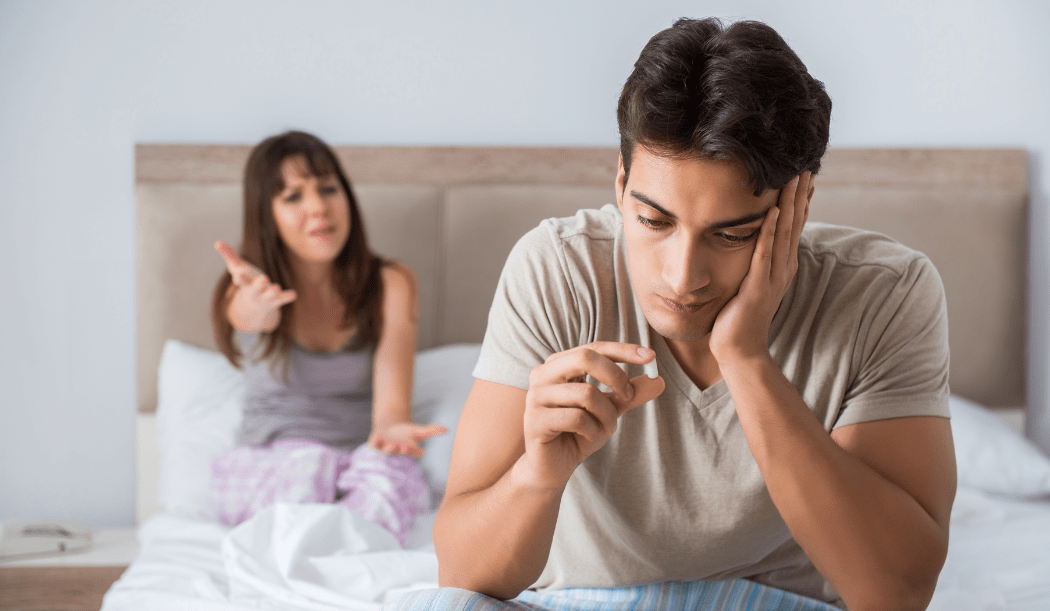We all know that mental health is as important as your sexual health. Antidepressants are a tried and tested way of helping us chaps get mentally healthy; however, antidepressants do have side effects, some of which can affect your bedroom abilities.
Yes, antidepressants are a powerful tool for treating depression and anxiety. You shouldn’t let a side effect keep you from great mental health, which is why we’re going to discuss the sexual side effects of antidepressants and what can help.
You no longer need to hold back on getting medication for your mental health!
Sexual side effects
Sexual side effects from antidepressants are common (although they’re not guaranteed). Often, antidepressants can lead to ejaculation (delayed or unachievable) and weak libido.
However, most men can get relief from the sexual dysfunction caused by antidepressants while taking medication.
What solutions are there
Solutions to get your chap on track, whilst keeping your meds, could be incredibly simple. Here are some of the ways that could offer you some much-needed relief.
A dosage change could be the way!
It’s essential that, when a side effect occurs, you don’t just stop your meds. Antidepressants need to be weaned off and can cause some nasty reactions if you just stop them. However, you likely don’t need to stop them completely.
You may find that the antidepressant isn’t even the cause. There are many medical causes for sexual dysfunction, such as depression, anxiety disorders, and substance abuse. Some people even improve their sexual function when on antidepressants, indicating that their loss of function was a side effect of their depression.
There’s no reason to wait; chat with your psychiatrist or physician to try to sort it out. You’ll need to get their advice before changing your medication or dosage. Even the mildest of antidepressants can cause seizures if you suddenly stop them, so make sure you follow your physician’s guidelines.
One of the easiest ways to counteract the side effect is through a simple change in dosage. Your medical practitioner can guide you through the process, and you’ll likely find that either lowering it, skipping a dose or taking it later in the day could be the solution you’re looking for.
Some Antidepressants Are Riskier Than Others
Two classes of antidepressants have a more significant risk of sexual dysfunction than others.
SSRIs (Selective Serotonin Reuptake Inhibitors), such as citalopram (Celexa), escitalopram (Lexapro), fluoxetine (Prozac), fluvoxamine (Luvox), paroxetine (Paxil), and sertraline (Zoloft) are the first group. Of all the SSRIs, Paxil is considered to be the most problematic. So much so that Paxil is often prescribed for premature ejaculation to prolong the time to orgasm.
The other group is the serotonin-norepinephrine reuptake inhibitors (SNRIs) – desvenlafaxine (Khedezla, Pristiq), duloxetine (Cymbalta), levomilnacipran (Fetzima), and venlafaxine (Effexor). However, it’s good to note that some of the newer antidepressants, such as vilazodone (Viibryd) and vortioxetine (Trintellix), have been shown to have much lower rates of sexual dysfunction than traditional SSRI and SNRI medications.
Bupropion (Wellbutrin) and mirtazapine (Remeron) also have lower rates of sexual dysfunction. So, you may just simply have to switch. Remember to use your doctor’s advice only, and antidepressants take a while to settle. You’ll find you won’t get an accurate idea of the daily side effects until at least two weeks after you start taking them regularly.
Are you taking a sedative?
If you’re taking a sedative, this could cause your ED! Sexual dysfunction has been reported with benzodiazepines used for anxiety; however, there isn’t much information on how many men are affected or how likely this will occur. The most common side effect reported is an impaired erection.
However, sedatives are rarely prescribed long-term. They’re usually only recommended for a short period, such as 2-4 weeks, which makes the chance of them causing long-term sexual dysfunction more minor.
Switching or Adding Medications Might Bring Relief
You may find that switching medications or even adding another may help ease your sexual dysfunction.
There are medications that could be prescribed to help deal with the side effects of your antidepressant while allowing you to stay on it.
It takes a while
It’s worthwhile to note that things don’t instantly change or get better once you’ve stopped your antidepressant or once you’ve changed/added a medication.
These types of medications are not quick fixes, so it will take a while for their effect to wear off or for the effect of the additional/different medication to start.
You may find that after you stop the treatment, you’ll continue to have sexual difficulties, and you may even develop another side effect, such as premature ejaculation.
Never fear, chaps. It only takes a while for things to go back to normal. Make sure you let your doctor know if you’re still struggling after a couple of weeks.
Conclusion
ED or sexual dysfunction isn’t fun, but mental health is vital, so you should focus on finding the right balance. It isn’t impossible, and if you chat with your doctor, you will likely find a solution that suits your needs.
However, don’t just assume your sexual dysfunction is due to your antidepressant. It’s always worthwhile getting a proper erectile dysfunction check!

2 Responses
Finding the right balance between medication and my mental health was a challenge, but with the help of my doctor, I was able to find a solution that worked for me!
It can really be frustrating when you find yourself trying to take care of your mental health only for it to cause you more confidence issues with side effects like ED. It is very important though to have an honest conversation with your doctor so that they can help you with such and you don’t get taken 5 steps back in your mental health Journey.